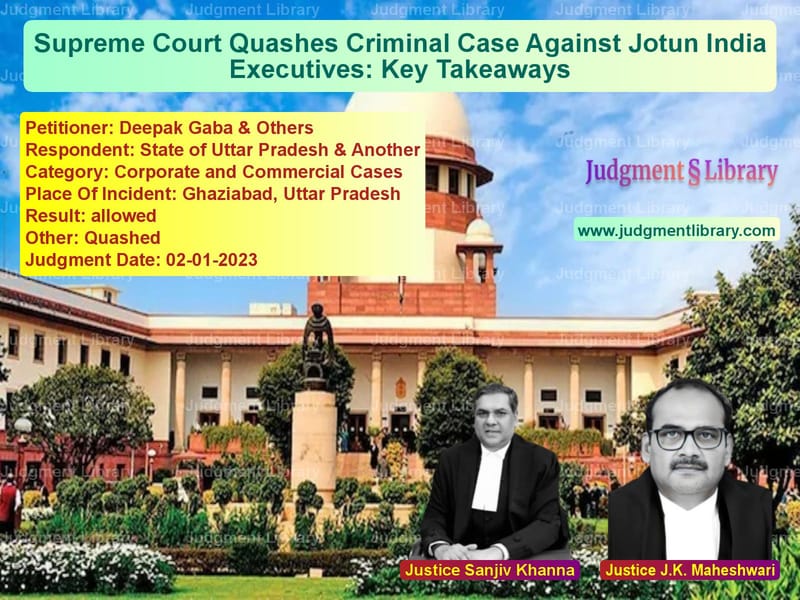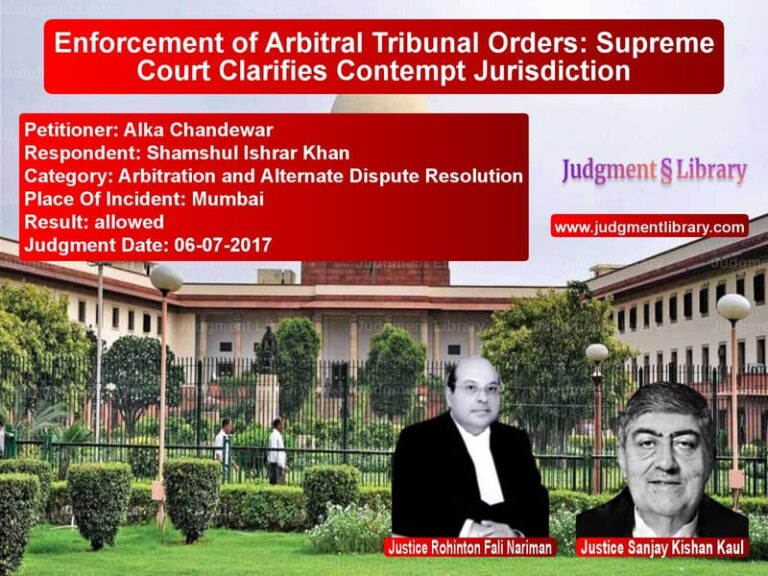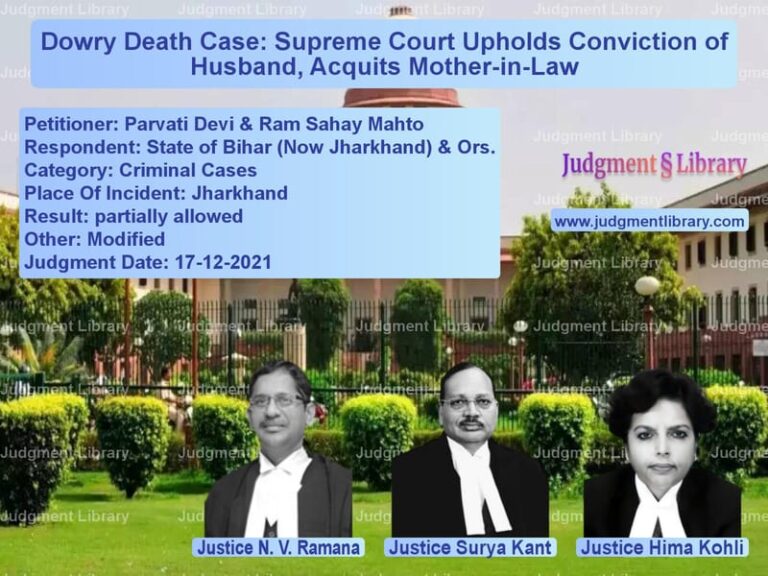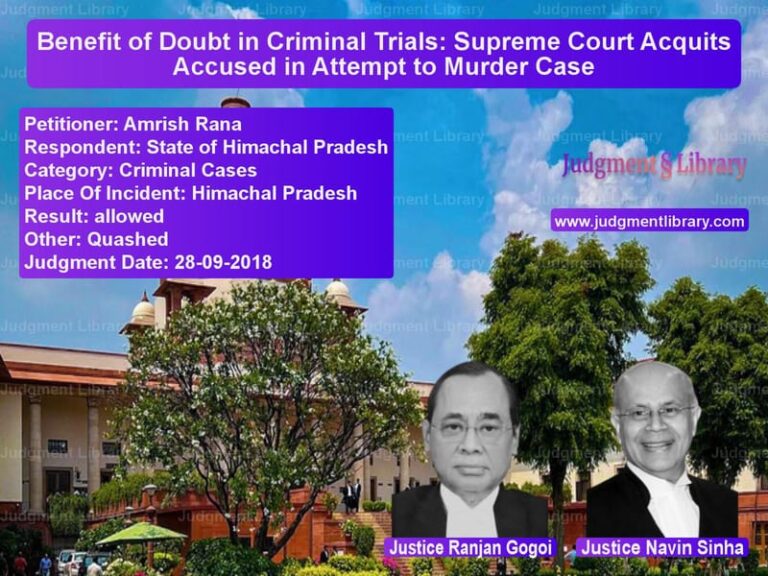Supreme Court Quashes Criminal Case Against Jotun India Executives: Key Takeaways
The case of Deepak Gaba & Others v. State of Uttar Pradesh & Another revolves around a commercial dispute that escalated into a criminal complaint under Section 406 IPC (Criminal Breach of Trust). The Supreme Court of India quashed the proceedings, citing the misuse of criminal law for settling contractual disputes. The judgment serves as an important precedent in protecting businesses and executives from vexatious litigation.
Background of the Case
The dispute arose between Jotun India Private Limited (JIPL), a subsidiary of the multinational Jotun Group, and Shubhankar P. Tomar, proprietor of Adhunik Colour Solutions. The two parties had entered into dealership agreements for the sale of decorative paints in Uttar Pradesh and Delhi. The dispute primarily concerned outstanding payments and alleged discrepancies in the goods supplied.
JIPL filed two complaints under Section 138 of the Negotiable Instruments Act (NI Act) against Tomar due to dishonored cheques amounting to Rs. 6,93,386. In retaliation, Tomar filed a private complaint against JIPL and its executives, alleging that they had forged demand statements for Rs. 6,37,252.16, which was not actually due.
Based on this complaint, the Additional Chief Judicial Magistrate (ACJM), Ghaziabad, issued a summoning order against JIPL and its executives under Section 406 IPC. This order was challenged before the Allahabad High Court, which dismissed JIPL’s petition. The appellants then approached the Supreme Court.
Key Legal Issues
1. Whether a Business Dispute Constitutes Criminal Breach of Trust?
The complainant alleged that JIPL and its executives committed criminal breach of trust by raising a false demand. However, the Supreme Court analyzed Section 405 IPC (which defines criminal breach of trust) and noted that:
- The complainant was never “entrusted” with any property belonging to JIPL.
- The dispute arose from a commercial transaction and should have been settled through civil remedies.
- A wrong demand does not amount to dishonest misappropriation or conversion of property.
2. Misuse of Criminal Law for Civil Disputes
The Court emphasized that criminal proceedings should not be used as a pressure tactic in purely business disputes. Citing Thermax Limited v. K.M. Johny and Pepsi Foods Ltd. v. Special Judicial Magistrate, the Court observed:
“Courts must be vigilant against attempts to use criminal law as an instrument of arm-twisting in disputes that are purely civil in nature.”
3. Lack of Prima Facie Case for Criminal Charges
The Supreme Court examined the complaint and found that it did not establish essential ingredients of criminal breach of trust. The Court noted:
- The complainant never alleged that he was deceived into delivering property to JIPL.
- There was no allegation of fraud or inducement—essential elements for an offense under Section 415 (cheating).
- The summoning order failed to specify which executive of JIPL was responsible.
4. Failure to Follow Due Process in Summoning
The Court criticized the lower courts for issuing summons without considering:
- Whether the complaint disclosed a cognizable offense.
- Whether the accused persons had been specifically named or their role had been detailed.
- The obligation under Section 202 CrPC to conduct an inquiry before summoning an accused residing outside the court’s jurisdiction.
Supreme Court’s Judgment
The Supreme Court allowed the appeal and quashed the proceedings against JIPL and its executives. The key findings were:
- The allegations did not establish criminal breach of trust.
- The dispute was purely civil and did not warrant criminal prosecution.
- The summoning order was legally flawed as it failed to establish a prima facie case.
The Court concluded:
“The criminal law machinery cannot be used to settle business disputes. The summoning order and all subsequent proceedings are quashed.”
Impact of the Judgment
The Supreme Court’s ruling has far-reaching implications for corporate litigation and criminal jurisprudence:
- Prevents misuse of criminal law: The ruling reinforces that criminal charges should not be used to pressure business opponents.
- Strengthens protections for business executives: The judgment ensures that corporate officials are not held personally liable for commercial disputes.
- Clarifies legal standards for criminal breach of trust: The ruling establishes that a mere outstanding demand does not constitute a criminal offense.
- Emphasizes due process in summoning orders: The Court reaffirmed the need for detailed judicial scrutiny before issuing summons in criminal cases.
Conclusion
The Supreme Court’s decision in Deepak Gaba & Others v. State of Uttar Pradesh is a landmark ruling that reinforces the boundary between civil and criminal liability. By quashing the criminal case against JIPL and its executives, the Court has ensured that corporate litigation remains within the domain of civil law and does not unfairly criminalize business disputes. This ruling serves as a strong deterrent against the misuse of criminal proceedings in commercial disagreements.
Read also: https://judgmentlibrary.com/escalation-claims-in-government-contracts-and-the-role-of-arbitration/
Petitioner Name: Deepak Gaba & Others.Respondent Name: State of Uttar Pradesh & Another.Judgment By: Justice Sanjiv Khanna, Justice J.K. Maheshwari.Place Of Incident: Ghaziabad, Uttar Pradesh.Judgment Date: 02-01-2023.
Don’t miss out on the full details! Download the complete judgment in PDF format below and gain valuable insights instantly!
Download Judgment: deepak-gaba-&-others-vs-state-of-uttar-prade-supreme-court-of-india-judgment-dated-02-01-2023.pdf
Directly Download Judgment: Directly download this Judgment
See all petitions in Corporate Compliance
See all petitions in unfair trade practices
See all petitions in Bankruptcy and Insolvency
See all petitions in Company Law
See all petitions in Judgment by Sanjiv Khanna
See all petitions in Judgment by J.K. Maheshwari
See all petitions in allowed
See all petitions in Quashed
See all petitions in supreme court of India judgments January 2023
See all petitions in 2023 judgments
See all posts in Corporate and Commercial Cases Category
See all allowed petitions in Corporate and Commercial Cases Category
See all Dismissed petitions in Corporate and Commercial Cases Category
See all partially allowed petitions in Corporate and Commercial Cases Category







